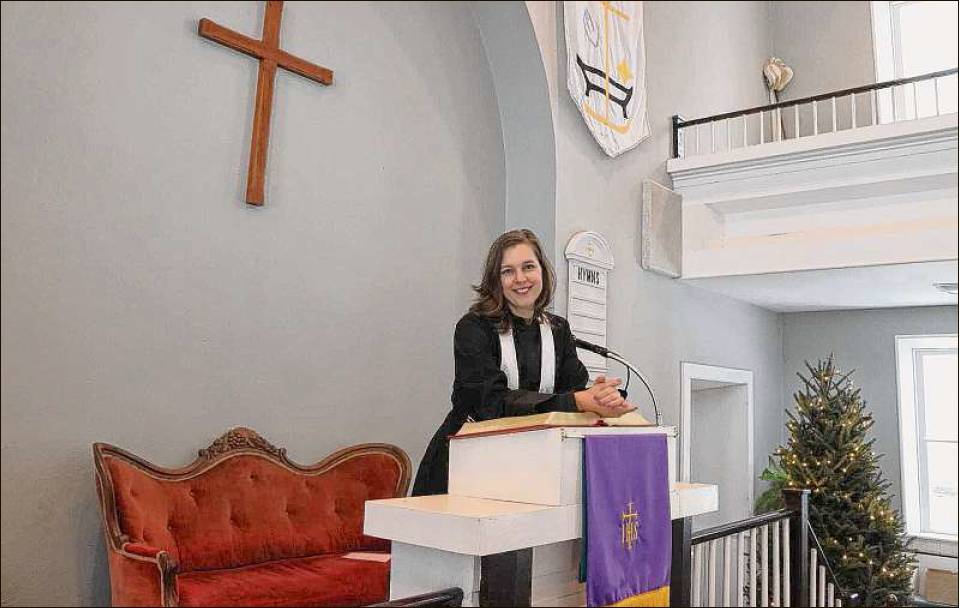VIEWPOINT
Women, be supportive of each other
By Lynn Horan
For the past decade, I have had the opportunity to serve as the first female solo pastor of two Presbyterian congregations, first in Delaware in a wealthy suburb of Philadelphia and most recently in New York's rural Columbia County.
This vocation has been incredibly meaningful, full of creativity and compassionate relationship-building but also fraught with the harmful outcomes of centuries of institutional patriarchy.
Despite being one of the earliest Protestant traditions to ordain women in 1956, the Presbyterian Church as well as other mainline Protestant denominations, continue to struggle with embracing female leadership, particularly young female pastors. The resistance comes from a surprising place: older women.
The age-old tension between mothers and daughters is well known. but continues to be silenced or ignored except in private conversations with therapists or occasional blow-ups over career choices or childrearing practices. But how is it that I find the very women who nurtured my generation’s personal and professional growth are now the very same women who struggle to accept the rising influence of young female pastors?
These questions are the center of my current doctoral research on Protestant female clergy attrition, as I conduct a national survey of young female pastors who have recently left the ministry.
A common thread that runs through each clergy interview is the powerful role that a handful of older female parishioners and regional church governance leaders can have.
Women who were raising families and carving out new career pathways 40 to 50 years ago, were faced with insurmountable challenges due to gender discrimination of their time. Now as their daughters come of age, with families of their own and leadership positions in every field, there is often a dark cloud of resentment, both subtle and overt, whereby some (certainly not all) older women distrust and reject young female pastoral leadership.
I emphasize some older women, because as every female leader can attest, there are always incredible older women in our lives who have encouraged us on our paths of self-discovery. The recipe for disaster occurs when young female pastors establish well-defined boundaries are faced with older female parishioners who reject such boundaries. For example, female clergy who are clear about their time availability and maintain a more restricted pastoral care calendar considering other pressing responsibilities, are often faced with ridicule and resentment from older female parishioners who expect higher levels of pastoral availability.
A compounding factor for many young female clergy are the dual roles of being both a pastor and parent, perhaps even primary caregiver, of young children, Small children expect a swift response 24/7 to their cry of "mom!" Just as church congregants expect when they call her as pastor. This view may partly stem from the feeling that emotional care and counseling mesh naturally into women’s work.
Due to the intimate and familial nature of congregational ministry, much can be drawn from the fields of psychology and family systems theory in order to unpack the tension within female pastor-parishioner relationships. But the traditional Freudian analysis of mother-daughter tension is woefully incomplete. Contemporary psychologists often describe the mother-daughter wound as feelings of loss or trauma that result when a mother may be physically present but unable or unwilling to provide emotional support or nurture to a daughter.
Seeking a solution
So, what can be done about this aching mother-daughter wound that currently exists in Protestant church culture?
The priority is to build awareness among clergy, congregations, and church governing structures that this relational dynamic does in fact exist. And this is the hardest pill to swallow. No one wants to air the family’s dirty laundry aired, much less church communities desperately seeking to present a united front that welcomes new and younger membership.
Second, expanded training in family systems theory and relational cultural theory can be included in seminary curriculum and training for church governance leaders who oversee pastoral employment contracts and severance negotiations. Third, support networks must be established for female clergy who leave the ministry vocation amid congregational conflict, to process the trauma and crisis of identity that occurs. And lastly, but most importantly, older female parishioners must be embraced and nurtured as they face their own struggles of identity in a changing world where their past sacrifices, choices and boundaries were often not acknowledged or respected.
My greatest hope, as a female clergy, mother and daughter, is that the inter-generational wounds that persist in our personal and professional lives do not destroy our relationships and communities, but instead offer the catalyst for renewed openness, compassion and willingness to change.
A compounding factor for many young female clergy are the dual roles of being both a pastor and parent, perhaps even primary caregiver, of young children.
▶ Lynn Horan is a previous contributor to the Nextgen Workbytes column. She began her career as a health policy analyst with the state Senate. She later entered the ministry as a Presbyterian clergy serving in central Peru, Kentucky, Delaware and New York. She is a doctoral fellow through Antioch University’s Graduate School of Leadership and Change where her research focuses on gender, spirituality, and leadership. www.lynnhoran.com
